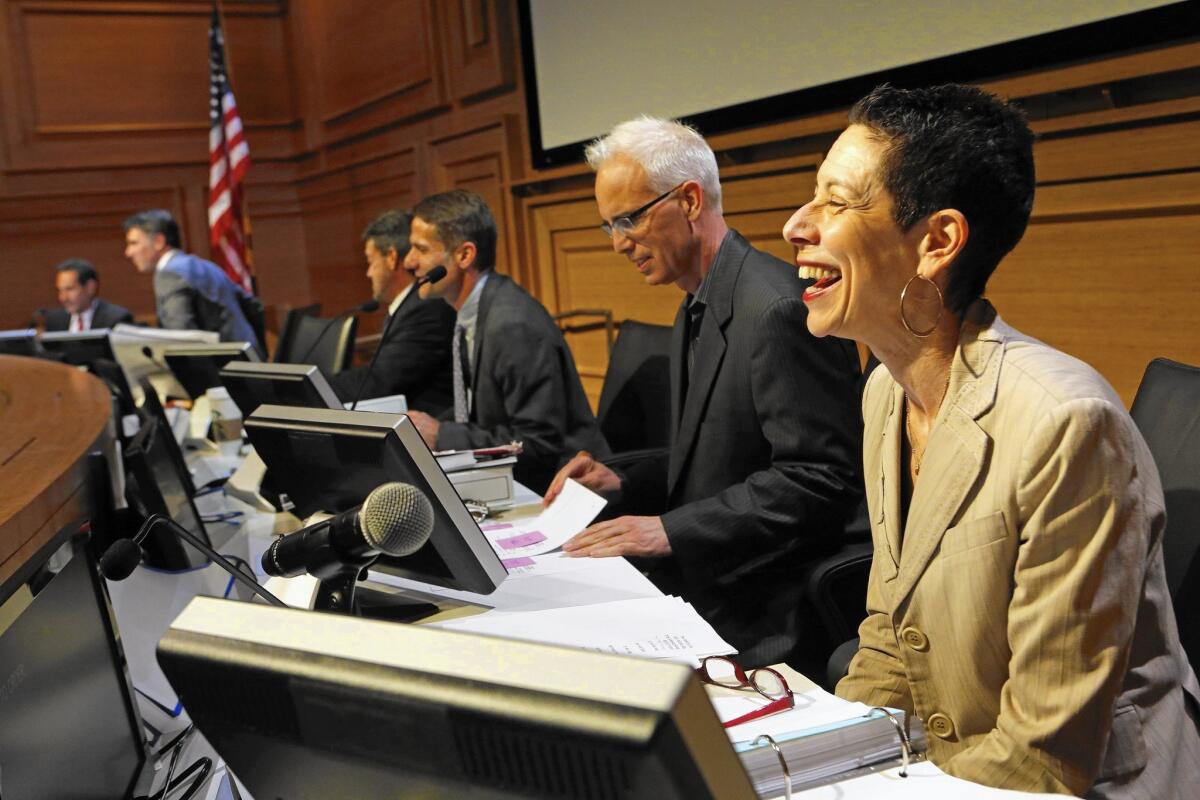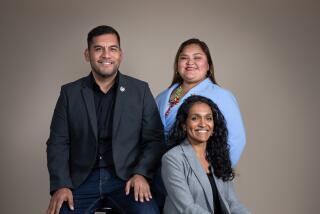Abbe Land, a familiar face on West Hollywood City Council, steps aside

- Share via
For years, the public face of West Hollywood has been the same: four gay men and one straight woman.
In a city where gay rights issues dominate the public conversation, that one woman has been a consistent feminist voice and a reminder that women’s issues matter too, even if nearly 40% of the city’s residents are gay men.
Councilwoman Abbe Land now is serving her final hours on the West Hollywood City Council. She will step aside Monday after 23 years in office and five stints as mayor, making her the second-longest-serving politician in a city that just turned 30.
“There is a preponderance of feelings that this is Boystown,” Land said recently in an interview at City Hall. “That’s the reality — the men are more visible than the women.”
Land, 59, has been an outspoken advocate for reproductive rights and pushed West Hollywood in 1993 to declare itself the nation’s first “pro-choice city.” She created the Women’s Advisory Board, which advises the City Council on women’s issues, and helped create a Domestic Violence Community Response Team for same-sex couples.
She also pushed the City Council to adopt a Lesbian Health Bill of Rights, helped launch the city’s public middle school option at Laurel School and officiated some of the first gay marriages in state history.
But Land also became a poster child for what some feel ails the young city — longtime incumbents who critics say have been overly comfortable in office and too chummy with developers. After years of trying, voters succeeded in 2013 in adopting term limits that restrict office-holders to three four-year terms. Land opposed the ballot measure.
Still, even leaders of the campaign for term limits said they would have preferred that some of Land’s colleagues leave before she did.
“People chose term limits because they wanted to have the opportunity to choose the candidates they wanted instead of having the same people there forever,” said longtime resident Scott Schmidt, who helped lead the campaign. “But it’s sad to see Abbe go.”
::
Land moved to California in the late 1970s to pursue acting after graduating from a Florida community college. But she veered into activism instead when she learned that she was going to be evicted from her apartment, which was being converted into condominiums.
Worried she’d lose her home, Land campaigned for cityhood with the Coalition for Economic Survival, a tenants’ rights group. Rent control and tenant protections in the renter-dominated area galvanized residents to push for cityhood.
But when West Hollywood became a city in 1984, it was the city’s gay activism — and its election of a lesbian mayor and the nation’s first openly gay council majority — that caught the world’s attention.
Land was appointed to the city’s first planning commission and then ran for council when Mayor Valerie Terrigno was convicted on federal embezzlement charges and resigned.
But Land was also a straight woman. Her 1986 race against Gene La Pietra, the millionaire owner of a gay dance club, was characterized as a race between tenants’ and gay rights and some worried her election might cut short the city’s historic gay council majority.
After winning a special election in a landslide, Land emerged as a champion for gay rights, so much so that Los Angeles County Supervisor Sheila Kuehl, an LGBT pioneer in California’s Legislature, once jokingly introduced Land at a meeting as a “flaming heterosexual.”
“She just can’t stand injustice,” Kuehl said. “It’s one of the things I really love about her. She just always seems to be smiling and yet firmly progressive.”
Councilman John Heilman, who lost the seat he’d held since 1984 in the recent city election, said most people think of Land as being part of the LGBT community.
“I don’t think of her as a straight woman,” he said.
When Lindsey Horvath moved to California and helped stage a West Hollywood production of the feminist play “The Vagina Monologues” in 2005, she was shocked when Land, then the city’s mayor, agreed to be narrator.
“I thought, ‘The mayor of West Hollywood is in ‘The Vagina Monologues’? You’ve got to be kidding me,’” Horvath said. “That’s how I knew this was going to be home for me.”
Horvath was elected to the council this month, along with another woman, Lauren Meister. If a woman is elected in the June special election to fill the empty seat of Jeffrey Prang, who was elected county assessor last year, it will be the first female council majority in the city’s history.
Horvath said it was Land who encouraged her to get into politics in the first place.
“She has always been the person who stood up and spoke out for women,” Horvath said. “She always made sure we had a voice and was a strong advocate for our issues.”
::
Land said the decision to leave the City Council was tough. The walls of her City Hall office displayed shovels from various city project groundbreakings, photos with national female politicians and a large, purple-framed flier from the 2004 March for Women’s Lives, a massive Washington, D.C., rally for reproductive rights in which Land led a delegation of West Hollywood women.
“I really struggled about thinking of not running again,” said Land, who plans to devote herself to her full-time job as the executive director and chief executive of the Trevor Project, a national nonprofit that provides suicide prevention services for LGBT youth.
She and her husband, Martin Gantman, an artist, will continue to live in West Hollywood and be involved, but she knows it will be different.
“It’s bittersweet,” she said. “At the end of the day, it’s a good decision, but I would be less than honest if I didn’t say I’m sad.”
More to Read
Sign up for Essential California
The most important California stories and recommendations in your inbox every morning.
You may occasionally receive promotional content from the Los Angeles Times.











